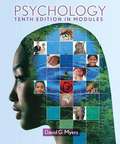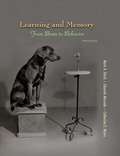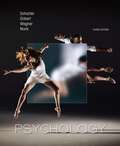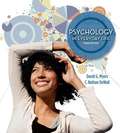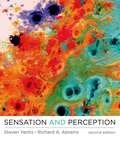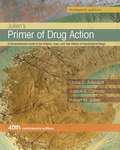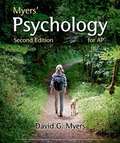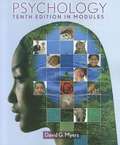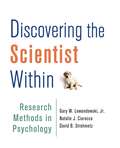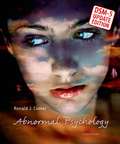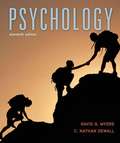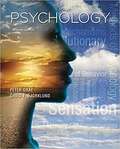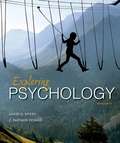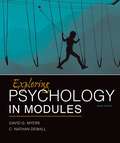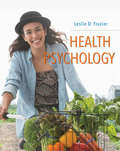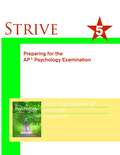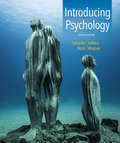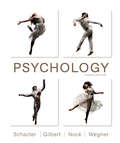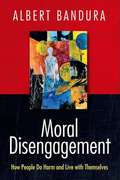- Table View
- List View
Psychology
by David G. MyersThis modules-based version of Myers' Psychology tenth edition breaks down the book's 16 chapters into 54 short modules. The condensed text allows students to better grasp and explore psychological concepts. It also makes for more flexibility in teaching, as cross-references to other chapters have been replaced with brief explanations.
Learning and Memory
by Catherine E. Myers Eduardo Mercado Mark A. GluckWith its modular organization, consistent chapter structure, and contemporary perspective, this groundbreaking survey is ideal for courses on learning and memory, and is easily adaptable to courses that focus on either learning or memory. Instructors can assign the chapters they want from four distinctive modules (introduction, learning, memory, and integrative topics), with each chapter addressing behavioral processes, then the underlying neuroscience, then relevant clinical perspectives. The book is further distinguished by its full-color presentation and coverage that includes comparisons between studies of human and nonhuman brains. The new edition offers enhanced pedagogy and more coverage of animal learning.
Psychology (Third Edition)
by Daniel L. Schacter Daniel T. Gilbert Daniel M. Wegner Matthew K. NockStudents rarely look at a psychology textbook after leaving college, but they will continue to encounter psychology throughout their lives. With that in mind, renowned authors and researchers Schacter, Gilbert, Wegner, and now Matthew Nock introduce students to today's research with a focus on the critical thinking skills that will stay with them beyond the course term. Quirky examples of thinking gone awry, and scenarios based on common psychological misconceptions are just some of the tools the authors use to get students to question what they think they know about psychological science.
Fundamentals of Abnormal Psychology Student Workbook
by Ronald J. Comer Gregory P. ComerStudent Workbook for Ronald J. Comer's Fundamentals of Abnormal Psychology SEVENTH EDITION
Exploring Psychology in Modules (Ninth Edition)
by David G. Myers C. Nathan DewallIn this ninth edition, the unwavering vision for Exploring Psychology is to merge rigorous science with a broad human perspective that engages both mind and heart.
Psychology in Everyday Life, Third Edition
by David G. Myers C. Nathan DewallDavid Myers' Psychology in Everyday Life speaks to all students regardless of their background or level of preparedness, with no assumptions made in the vocabulary, examples, or presentation.
Sensation and Perception
by Richard A. Abrams Steven YantisLike no other text, Sensation and Perception expertly introduces students to how we sense and perceive the world around us. Using clear and detailed explanations and highly effective illustrations the text illuminates the connections between mind, brain, and behavior in the realm of sensation and perception. Seamlessly integrating classic findings with cutting edge research in psychology, physiology and neuroscience Sensation and Perception 2e explores what questions researchers are seeking to answer to today and the methods of investigation they are using.Sensation and Perception, Second Edition, now includes 15 chapters, including separate chapters on motion perception, perception for action, olfaction, and gustation, and a new appendix on noise and signal detection theory The new edition introduces new coauthor Richard A. Abrams (Washington University).
Julien's Primer of Drug Action
by Claire D. Advokat Robert M. Julien Joseph E. ComatyIn its 40th anniversary edition, A Primer of Drug Action continues to evolve side by side with the field it covers, drawing on the expertise of its authors in medicine, basic science, and clinical science to offer the most current and comprehensive guide to psychopharmacology available.
Myers' Psychology for AP (Second Edition)
by David G. MyersWith an undeniable gift for writing, Dr. Myers will lead your students on a guided tour of psychological science and poignant personal stories. Dr. Myers teaches, illuminates, and inspires.Four years ago, we published this ground-breaking text which is correlated directly to the AP® course. Today, we build on that innovation and proudly introduce the 2nd AP® Edition. Whether you are new to AP® psychology or have many years under your belt, this uniquely AP® book program can help you achieve more.
Myers' Psychology for AP®
by David G. MyersThus begins market-leading author David Myers’ discussion of developmental psychology in Unit 9 of his new Myers’ Psychology for AP® Second Edition. With an undeniable gift for writing, Dr. Myers will lead your students on a guided tour of psychological science and poignant personal stories. Dr. Myers teaches, illuminates, and inspires. Four years ago, we published this ground-breaking text which is correlated directly to the AP® course. Today, we build on that innovation and proudly introduce the 2nd AP® Edition. Whether you are new to AP® psychology or have many years under your belt, this uniquely AP® book program can help you achieve more.
Psychology: In Modules (Tenth Edition)
by David G. MyersThis modules-based version of Myers' Psychology tenth edition breaks down the book's 16 chapters into 54 short modules. The condensed text allows students to better grasp and explore psychological concepts. It also makes for more flexibility in teaching, as cross-references to other chapters have been replaced with brief explanations.
Discovering the Scientist Within Research Methods in Psychology
by Gary W. Lewandowski Natalie J. Ciarocco David B. StrohmetzIn this breakthrough first edition, authors Gary Lewandowski, Natalie Ciarocco, and David Strohmetz draw on their extensive classroom experiences to introduce research methodology in a highly effective, thoroughly engaging new way, maximizing students’ familiarity with every step of the process. For the first time in a methods text, each design chapter follows a single study from ideation to writing for publication, with students researching an intriguing question emerging from a chapter-long case study. Also for the first time in a methods text, each design chapter models the entire research process, so students get multiple opportunities to experience that process start to finish.
Learning and Memory: From Brain to Behavior (Second Edition)
by Mark A. Gluck Eduardo Mercado Catherine E. MyersDevelopments in neuroscience have changed the field of learning and memory significantly in the last ten years. This comprehensive introduction to learning and memory covers behavioural processes, brain systems, and clinical perspectives.
Abnormal Psychology (Eighth Edition)
by Ronald J. ComerAn inspiring and clearly written graduate textbook with psychology concepts explained in a way easy to comprehend with updates on DSM-5.
Psychology 11th Edition
by C. Nathan Dewall David G. MyersDavid Myers' new partnership with coauthor C. Nathan DeWall matches two dedicated educators and scholars, each passionate about teaching psychological science through writing and interactive media. With this new edition of the #1 bestselling Psychology, Myers and DeWall take full advantage of what an integrated text/media learning combination can do. New features move students from reading the chapter to actively learning online: How Would You Know puts students in the role of scientific researcher and includes tutorials on key research design principles; Assess Your Strengths self-tests help students learn a little more about themselves, and include tips about nurturing key strengths. These and other innovations rest on the same foundations that have always distinguished a new David Myers edition--exhaustive updating (hundreds of new citations), captivating writing, and the merging of rigorous science with a broad human perspective that engages both the mind and heart. This edition of Psychology is accompanied by its own dedicated version of Worth Publishers' breakthrough online course space, featuring a fully integrated e-Book, LearningCurve adaptive quizzing, a rich collection of student media resources, and easy setup, assessment, and course management options for instructors. What's in the LaunchPad
Psychology
by Peter O. Gray David F. BjorklundPeter Gray's evolutionary perspective and emphasis on critical thinking have made his rigorous yet accessible introduction to psychology a widely respected classroom favorite, edition after edition. Now thoroughly revised, with the help of new co-author David Bjorklund, Psychology, Seventh Edition, invites and stimulates students to investigate the big ideas in psychological science.
Exploring Psychology, Tenth Edition
by David G. Myers C. Nathan DewallThe new edition of Exploring Psychology offers outstanding currency on the research, practice, and teaching of psychology. Myers and DeWall inspire students with fascinating findings and applications, effective new study tools and technologies, and a compassionate and compelling storytelling voice. Their presentation is based on the same guiding principles behind the entire family of textbooks that have made David Myers the world’s bestselling introductory psychology author: Facilitate learning by teaching critical thinking and helping students at every step. Present psychology as a science, emphasizing the process of inquiry and putting facts in the service of concepts. Make sure students come away with an appreciation of psychology’s big ideas, and with a deeper respect for humanity—what drives us, distinguishes us, unifies us. This Exploring Psychology is the first to include Myers’ handpicked co-author. Nathan DeWall shares Myers’ belief that instilling a sense of curiosity and inquiry about psychological science is an effective way to help students navigate the content, think critically, and prepare for a lifetime of learning and living. The extraordinary, longtime Myers ancillary author team is also here—a group whose teamwork, consistency, and commitment again sets the industry-standard for instructor and student supplements. The high quality that consistently sets Myers’ ancillaries apart sees a new incarnation in LaunchPad. This course space organizes all the book’s digital resources in an online format that makes it easier for instructors to teach, track, and assess their students
Exploring Psychology In Modules
by David Myers C. DeWallThe new edition of Exploring Psychology in Modules offers outstanding currency on the research, practice, and teaching of psychology. Myers and DeWall inspire students with fascinating findings and applications, effective new study tools and technologies, and a compassionate and compelling storytelling voice.
Health Psychology (First Edition)
by Leslie D. FrazierHealth Psychology provides a science and empirically-based approach to health psychology. It goes beyond other mainstream textbooks by introducing students to global and cross-cultural health issues, covering cutting-edge scientific and medical topics in ways that students can understand. The author integrates core theory, research, and practice in an engaging and practical way. The author integrates the biopsychosocial perspective, building on traditional content and topics in order to aid student understanding, interest, and learning. This textbook incorporates engaging applications, case studies and frequent examples, clear and thorough explanations, and a student-friendly tone. It insists on the implications of positive and negative health behaviors for a student's life. The author also provides an emphasis on developmental influences on health. Within each chapter, thought-provoking issues drawn from the World Health Organization and other international health organizations highlight our current understanding of health and wellness. Chapters open with personal profiles, ending with how the chapter addresses the questions that these raise.
Psychology (Seventh Edition)
by Sandra E. Hockenbury Susan A. Nolan Don H. HockenburyThis acclaimed classroom favorite makes the science of psychology (and through that, the process of science itself) come alive for students, with personal stories that exemplify important concepts in a student-friendly way, and with coverage of the field's scientific foundations and advances that is accessible without being oversimplified. <P><P>The substantially updated new edition extends the book's focus on developing scientific literacy in the context of psychology, with new features in print and in the book's new online course space, LaunchPad. These features are the result of the book's most dramatic addition: Sandra Hockenbury's new writing partnership with co-author, Susan Nolan, who shares her belief that the introductory course can help all kinds of students develop a real understanding of psychology and lasting scientific literacy without sacrificing the field's research core.
Strive for a 5: Preparing for the AP Psychology Examination
by David G. Myers Allison Herzig Nathaniel Naughton Laura BrandtThis book, Strive for a 5: Preparing for the AP® Psychology Examination, is designed for use with Myers' Psychology for AP®, Second Edition, by David G. Myers. It is intended to help you evaluate your understanding of the material covered in the textbook, reinforce the key concepts you need to learn, develop your conceptual understanding and communication skills, and prepare you for success on the AP® Psychology exam. This book is divided into two sections: a study guide section which will review each of the units in the textbook, and a test preparation section
Sensation and Perception, 2nd Edition
by Richard A. Abrams Steven YantisLike no other text, Sensation and Perception expertly introduces students to how we sense and perceive the world around us. Using clear and detailed explanations and highly effective illustrations the text illuminates the connections between mind, brain, and behavior in the realm of sensation and perception. Seamlessly integrating classic findings with cutting edge research in psychology, physiology and neuroscience Sensation and Perception 2e explores what questions researchers are seeking to answer to today and the methods of investigation they are using. Sensation and Perception, Second Edition, now includes 15 chapters, including separate chapters on motion perception, perception for action, olfaction, and gustation, and a new appendix on noise and signal detection theory The new edition introduces new coauthor Richard A. Abrams (Washington University).
Introducing Psychology
by Daniel L. Schacter Daniel T. Gilbert Matthew K. Nock Daniel M. WegnerIntroducing Psychology is distinguished by an author team equally at home in the classroom, in the lab, and on the bestsellers list, with each author an expert teacher and accomplished researcher, and with three of the authors having written popular general interest books. It's a textbook written to keep students turning the pages, introducing students to psychology’s scientific foundations with an offbeat, example-rich writing style that's anything but that of a typical textbook. <p><p> This edition of Introducing Psychology has been completely retooled for the classroom. For the first time, each chapter section begins with Learning Outcomes to help students come away from the reading with a "big picture" understanding of psychology as a living science, not just a collection of facts. This edition also includes a new feature called A World of Difference, drawing on pivotal research to show the importance of sex, gender, culture, SES, and ethnicity in understanding psychology. Also highlighted—the popular Data Visualization Activities, a unique resource for building quantitative reasoning skills.
Psychology
by Daniel Wegner Daniel Schacter Daniel Gilbert Matthew NockThis widely used, enthusiastically received textbook is the work of one of the most accomplished author teams in introductory psychology, each a distinguished educator and researcher, and three of them (Schacter, Gilbert, and Wegner) authors of bestselling books for general readers. Together, they offer an approachable, engagingly written survey of the field’s main ideas, filled with unusual stories, memorable examples, and lots of humor to captivate all kinds of students. Again carried by the authors’ exceptional communication and teaching skills, the new edition has been retooled for the classroom chapter by chapter. Sections in each chapter now have specific Learning Outcomes in place, to emphasize “big picture” concepts and guide student learning. There is also new boxed feature called A World of Difference highlighting important research on diversity and individual differences.
Moral Disengagement: How People do Harm and Live with Themselves
by Albert BanduraThey do so by sanctifying their harmful behavior as serving worthy causes; they absolve themselves of blame for the harm they cause by displacement and diffusion of responsibility; they minimize or deny the harmful effects of their actions; and they dehumanize those they maltreat and blame them for bringing the suffering on themselves.
